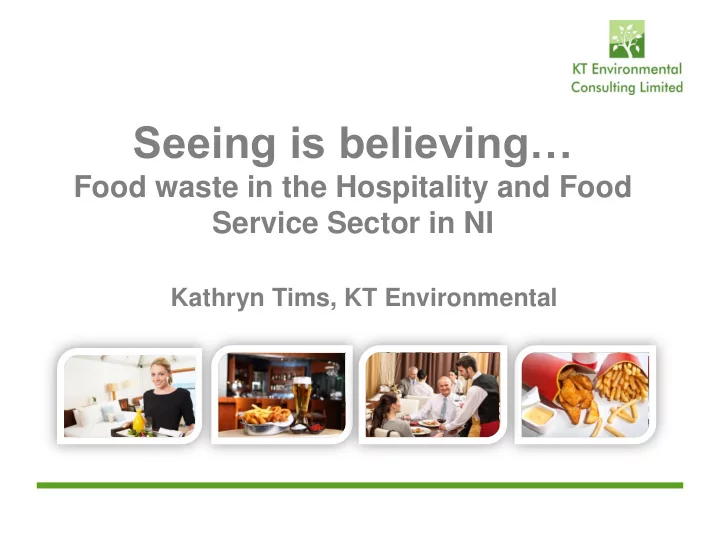

Seeing is believing… Food waste in the Hospitality and Food Service Sector in NI Kathryn Tims, KT Environmental
Overview • Food waste costs – the business case • WRAP & The Hospitality and Food Service Sector Voluntary Agreement (HaFSA) • Hospitality Sector in NI • Cost Sector in NI • Seeing is believing! • First steps?
Counting the cost • The cost of food waste to the Hospitality and Food Service (HaFS) Sector is £2.5 billion a year in 2011 and rising to £3 billion by 2016. Source: WRAP Research
Counting the cost • UK HaFS outlets produce a total of almost 3 million tonnes of waste per year, – Packaging (1.3 million tonnes), – Food waste (0.92 million tonnes), and – ‘Non -Food' wastes (0.66 million tonnes). • 18% of all food purchased by the Sector ends up being thrown away ( as avoidable or unavoidable food waste). Source: WRAP Research
Source: WRAP Research
The bottom line • Each tonne of food waste prevented saves £2,800 of total (avoidable and unavoidable food) costs (sector average) • This rises to £3,700 / tonne when considering avoidable food waste • Each tonne of food waste that is disposed in landfill will generate 4.2 tonnes of greenhouse gases contributing to climate change Source: WRAP Research
Voluntary Agreement • The Hospitality and Food Service Agreement (HaFSA) is a voluntary agreement to support the sector in reducing waste and recycling more.
The HaFSA targets 1. Prevention target: To reduce food and associated packaging waste arising by 5% by the end of 2015. 2. Waste management target: To increase the overall rate of food and packaging waste being recycled, sent to Anaerobic Digestion or composted to at least 70% by the end of 2015 .
A Selection of Signatories of the HaFSA
A Selection of Supporters of the HaFSA
Hospitality Sector in NI • What has been happening to date… • Site specific reviews and development of management plans for the signatories • Training on reducing waste through menu planning • Good practice case studies
Hospitality Sector • Video Screencasts for Environmental Health professionals in partnership with CIEH NI • Measuring and Understanding where food waste comes from in your kitchen – hands on approach and “Winnow” trials
Cost of Food waste to the Cost Sector in NI
Project • Funded by DoENI’s Rethink Waste programme • Partnership between KT Environmental Consulting and ARENA Network • Focusing on the cost sector and its supply chain • Aims to contribute to diversion of food and food packaging waste from landfill • Running from July 2013 to March 2014 • With ongoing engagement to 2016
Participants • Serco • South Eastern HSC Trust • Sodexo • Western Education • Baxter Storey and Library Board • Elior • Stranmillis University • Belfast City Council College • Newtownabbey Council • Queen's University • NI Assembly Belfast • Northern Health & • Belfast Met College Social Care Trust
Sectors represented In which sectors do you operate in Northern Ireland? 70.0% 60.0% 50.0% 40.0% 30.0% 20.0% 10.0% 0.0% Staff catering Healthcare Education Services
Food Waste findings Type of Food Contract Education Healthcare Local Combined Waste caterers (tonnes food (tonnes food Authority Total waste / yr) waste / yr) (tonnes food (tonnes food (tonnes per waste / yr) waste / yr) year) 5.35 10.00 6.50 0.80 22.66 Unavoidable Food Waste 16.05 30.01 19.51 2.40 67.97 Avoidable Food Waste 4.01 7.50 9.76 1.20 - Sector Average 21.40 40.01 26.02 3.20 90.63 Total Food Waste
Costs of Food Waste Type of Food Contract Education Healthcare Local Combined Waste caterers (£ food (£ food Authority (£ Total (£ waste / yr) waste / yr) (£ food food waste / food waste waste / yr) yr) per year) £44,940 £84,021 £54,634 £6,720 £190,315 Avoidable Food Waste £11,235 £21,005 £27,317 £3,360 - Sector Average £59,920 £112,028 £72,845 £8,960 £253,753 Total Food Waste
Findings • Good levels of recycling for cardboard, plastic, glass and cans, more can be done! • Limited used of dedicated food waste collection • Generally poor levels of data for food waste and food packaging waste (40% had no food waste data available and had to extrapolate)
Summary • From a combination of actual and extrapolated data • 90.6 tonnes of food waste were identified • 68 tonnes avoidable food waste • Maximum amount of food waste a year recorded is 16 tonnes and the minimum is 0.4 tonne. • Average 7 tonnes of food waste generated by each business / yr
Food Waste Costs! • Food waste (purchase, prep, storage, service and disposal) costs £2,800 / tonne • £252,000 value to the sector! • £19,384 on average to each business
First steps? • These studies show that food waste costs businesses • Seeing is believing! • Measure, measure, measure… • Realistic to aim for a 20% reduction in food waste
Contact Kathryn Tims kathryn@ktenvironmental.com
Recommend
More recommend